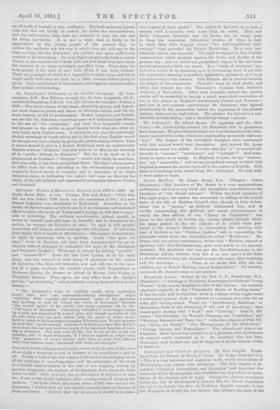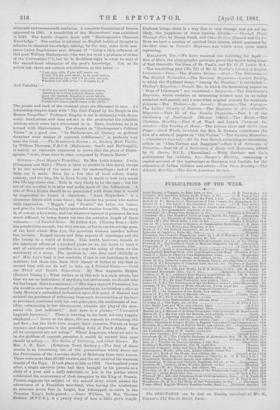Shakespeare and Classical Antiquity. By Paul Stnpfer. Trans- lated front
the French by Emily J. Carey. (C. Kegan Paul and Co.) —This is a very laborious and complete work, which all students of Shakespeare may consult with advantage. The first chapter is de- voted to " Classical. Antecedents and Examples," and describes the materials which Shakespeare, who doubtless was dependent on trans- lations of the classics, had at hand. Among the classics translated before the end of Shakespeare's literary life, the Greek tragedians are not to be found ; but then, as Professor Stapfor remarks, it was not &Bellies or Sophocles, but Seneca, that pleased the taste of the sixteenth and seventeenth centuries. A complete translation of Seneca appeared in 1581. A translation of the Mennechmei was published in 1591. Tho fourth chapter deals with " Shakespeare's Classical Knowledge." The author is satirical on English habits of thought in relation to classical knowledge, talking, by the way, some little non- sense (what Englishman over dreamt of "being a little ashamed of this poor William Shakespeare, who was not even a graduate of either of the Universities ?"), but he is doubtless right in what ho says of the second-hand character of the poet's knowledge. Yet, as he points out, there are curious coincidences, as this below :- " I rim your wife, if you will marry me, If not, I'll die your maid ; to be your fellow, You may deny me ; but I'll he your servant, Whether you will or no."—norpest, ii., 2.
And Catullus :-
" Si tibi non eordi fuerant connubin, rostra, Attamen in vestrart potuisti (Moore aeries use tibi juoundo famularer serve, laboro,
Oandide, permnicens liquidis vestigla lymph's, Purpuretive tunm constornens rests cubile."
The poems and each of the classical plays are discussed in turn. An interesting chapter deals with " The Part Played by the People in the Roman Tragedies." Professor Stapfor is not in sympathy with demo- cratic institutions, and does not see in the proletariat the infallible wisdom which some have discovered in it. Here, doubtless, ho is in accord with Shakespeare. The chapter on "Shakespeare's Political Views" is a good one. " To Shakespeare, all literary or political doctrines were matter of supreme indifference," is probably very near the truth.—The Renascence Drama or, History Made Visible, by William Thomson, F.R.C.S. (Melbourne : Sands and McDougall), is mainly an elaborate argument to prove that the plays of Shake- speare, "were, from time to time, composed by Francis Bacon."



































 Previous page
Previous page